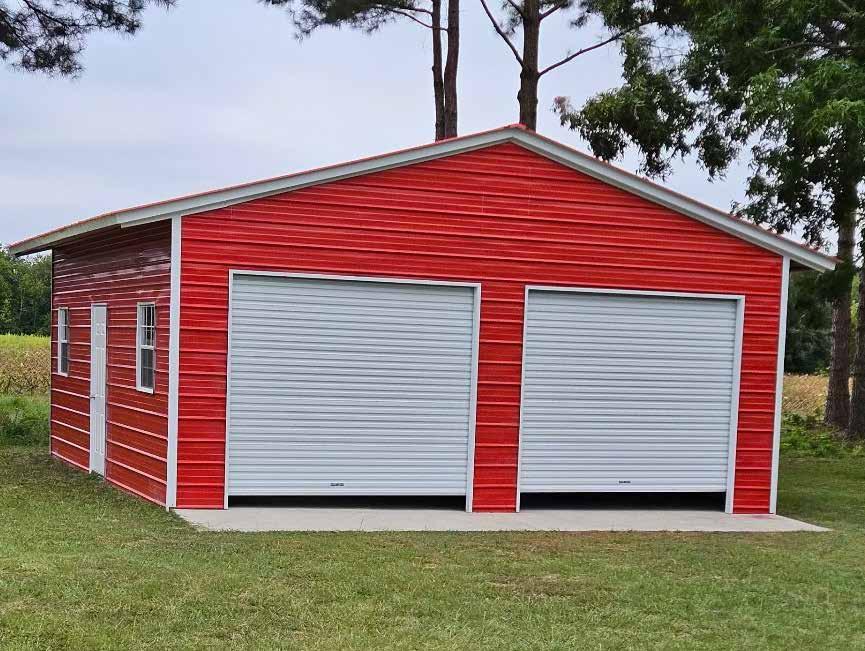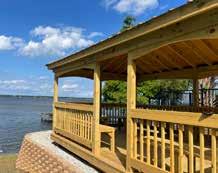Kicking up dust.
From back roads to viral feeds, field parties tied to Black cowboy history are making room for joy, style and belonging
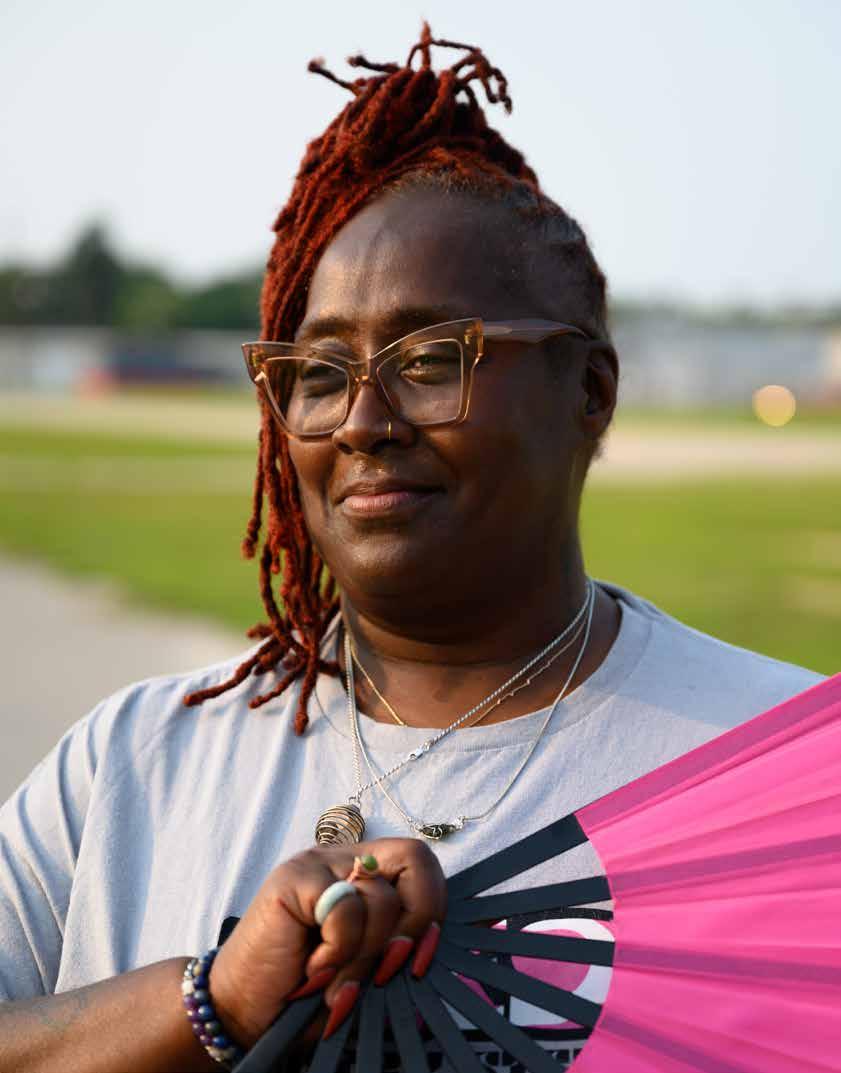

From back roads to viral feeds, field parties tied to Black cowboy history are making room for joy, style and belonging

Revived by locals and rooted in history— Elloree's signature event gallops on.
PLUS: Congaree National Park lights up with fireflies each year
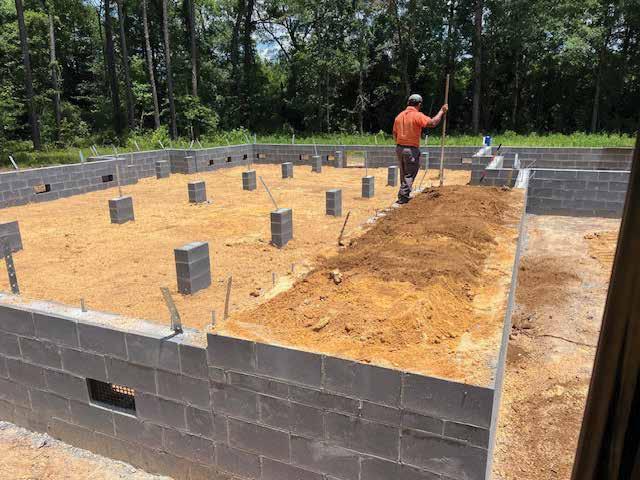
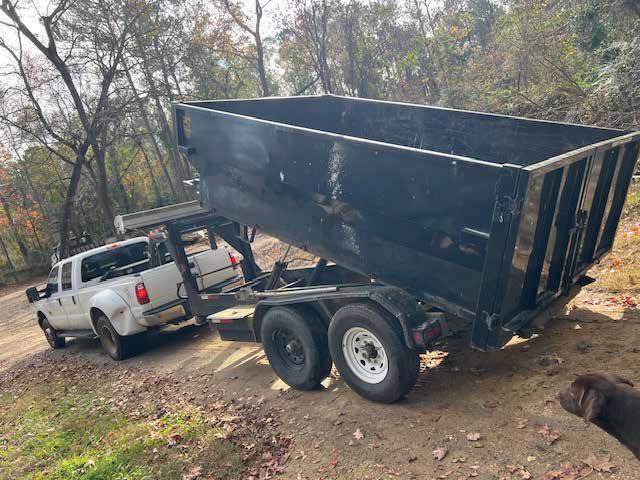


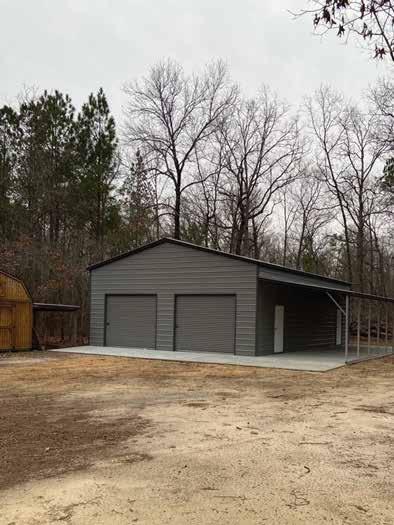










































PUBLISHER
Vince Johnson
EDITOR
Kayla Green
COPY EDITORS
Rhonda Barrick
Melanie Smith
WRITERS
Deirdre Currin
Alaysha Maple
Bruce Mills
PHOTOGRAPHY
Abigail Pittman
PUBLICATION DESIGN
Janel Przybyla
ADVERTISING / GRAPHIC DESIGN
Cary Howard
Janel Przybyla
ADVERTISING CONSULTANTS
Karen Cave karen@theitem.com
Devin McDonald devin@theitem.com
Mark Pekuri mark@theitem.com


Donna Dawson and her group, TruKuntry Steppas, hail from Sumter and are among the hundreds of line dancers who have embraced the trail ride and field party culture that has taken social media by storm. Dawson, while joyful about its virality, emphasized the roots of these gatherings are fun and fellowship — and hopes to showcase that wherever they go.



Trail riding comes to Sumter Trail rides and field parties have evolved from quiet rural traditions into vibrant cultural celebrations. Poinsett State Park Poinsett State Park offers mountain-like trails, water activities and camping within a historically rich, 1,000-acre landscape.

24

Each May, Congaree National Park hosts a limited viewing of its rare synchronous fireflies.

Glowing nights
Elloree Trials returns Off to the races at Elloree Trials
Farm life From backyard roots to big dreams: the growth of relinoca farms
Join SC7 for an Expedition Hike at Poinsett State Park with your family this summer. On Wednesday, July 16, from 9 a.m. to noon, take a guided 3.5-mile hike and explore sections of the Knot, Coquina and Splice trails, seeing everything from pine uplands to lush, fern-filled ravines. You'll learn about the unique natural features of the park, its connection to the broader S.C. park system and ways to engage with the outdoors through hiking, conservation and stewardship. Meet at the park office parking lot. The park is at 6660 Poinsett Park Road, Wedgefield. If you can't make the morning hike, there will be another, shorter hike the same day from 2 to 4:30 p.m. with the group at Swan Lake Iris Gardens. The 2.25-mile hike will focus on local conservation efforts, student-led research and the community's environmental stewardship. Meet at Health Pavilion, 165 Garden St., Sumter. Both will be easy hikes that are open to all with free admission.
If hiking isn't your thing, perhaps kayaking with SC7? Take a 5.7-mile paddle around Sparkleberry Swamp on Thursday, July 17, from 9 a.m. to noon. Bring your own kayak or canoe, or book your excursion through Coastal Expeditions at https://coastalexpeditions.com. The swamp at the northern end of Lake Marion in South Carolina's Santee region is a submerged forest of cypress and tupelo trees with plenty to see, including great blue herons, white egrets, owls, woodpeckers and the prothonotary warbler. The trip is an easy paddle, free and open to all. Meet at Sparkleberry Landing Road.
There are five bands scheduled to bring hits and all genres of tunes to downtown Sumter through the Fourth Fridays Concert Series this summer. The schedule this year is: July 25 – United Sound Entertainment, Aug. 22 –
Chris Taylor & The Rumor and Sept. 26 – Sole Purpose. Concert attendance is free, and there will be plenty of food and drink available for sale. Sertoma will have plenty of cold brews for sale, Palmetto Optimist Club will be back with free books for the kids and popcorn for sale. Downtown restaurants will be open for dine-in and take-out.
Find a bite to eat this summer as Swan Lake Iris Gardens presents Food Truck Saturdays through Aug. 9. Each Saturday from 11 a.m. to 4 p.m., get lunch from various food trucks with a nice view at the lake, 822 W. Liberty St. Admission to the gardens is free.
Cars and Coffee Sumter invites the community to join the group this summer to enjoy each other's company and check out all types of vehicles. Cars, trucks and motorcycles are welcome. Coffee, water and doughnuts will be available, first come, first served. Cars and Coffee Sumter T-shirts will also be available. Donations benefit Helping South Carolina, a 501(c)3 nonprofit of Sumter. Join the group, and bring your best ride. The events are at Gamecock Lanes, 817 Broad St., Sumter, on June 28, July 26 and Aug. 23 from 9 to 11 a.m. Email carsandcoffeesumter@gmail.com for more information.
Kick up dust with Southern Vibes Entertainment as it presents Field Fest 2025: Boots On The Ground on Saturday, July 19. This country-themed extravaganza will be a day filled with good music, great vibes and, of course, dancing. Anyone under 18 will only be permitted with a parent or guardian. The event will be at 3155 Oswego Hwy. Buy tickets at https:// tinyurl.com/wy364jfs.
Pee Dee Outdoor Classic
The Pee Dee Outdoor Classic is making its much-anticipated return to the Florence Center, 3300 W. Radio Drive. From July 25–27, outdoor enthusiasts of all ages are invited to explore the ultimate outdoor experience. The Pee Dee Outdoor Classic is your one-stop shop for everything outdoors – from fishing, hunting and camping to ATVs, camo gear and much more. This event brings together the region’s top outdoor brands, products and experts all under one roof. Plus, enjoy exciting live animal demonstrations. This year’s event is presented by Peanut Patch, Raldex Hospitality, Palmetto Mining, King Cadillac Buick GMC, Pee Dee Rod and Gun Magazine, Pepsi of Florence and Mill Creek Retrievers. Event dates and show times are: Friday, July 25: 1-8 p.m.; Saturday, July 26, 9 a.m.-6 p.m.; and Sunday, July 27, 1 a.m.-5 p.m. Tickets are $10, general admission; kids 12 and under, free. For tickets and more information, visit www.florencecenter.com or call (843) 679-9417.
Jebb Mac Band
Enjoy summer beats by the Jebb Mac Band on Saturday, July 19, at 7 p.m. in Camden. The United Way of Kershaw County is hosting this Summer Bash fundraiser, “an epic night of music.” Must be 21 or older to attend. Tickets can be purchased through Eventbrite, https:// tinyurl.com/4a6mp7fz, or United Way of Kershaw County’s website. Event will be at 1011 Galleria in downtown Camden.






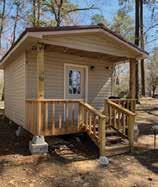





Poinsett State Park has plenty for hikers and bikers in the ‘Mountains of the Midlands’
By Bruce Mills
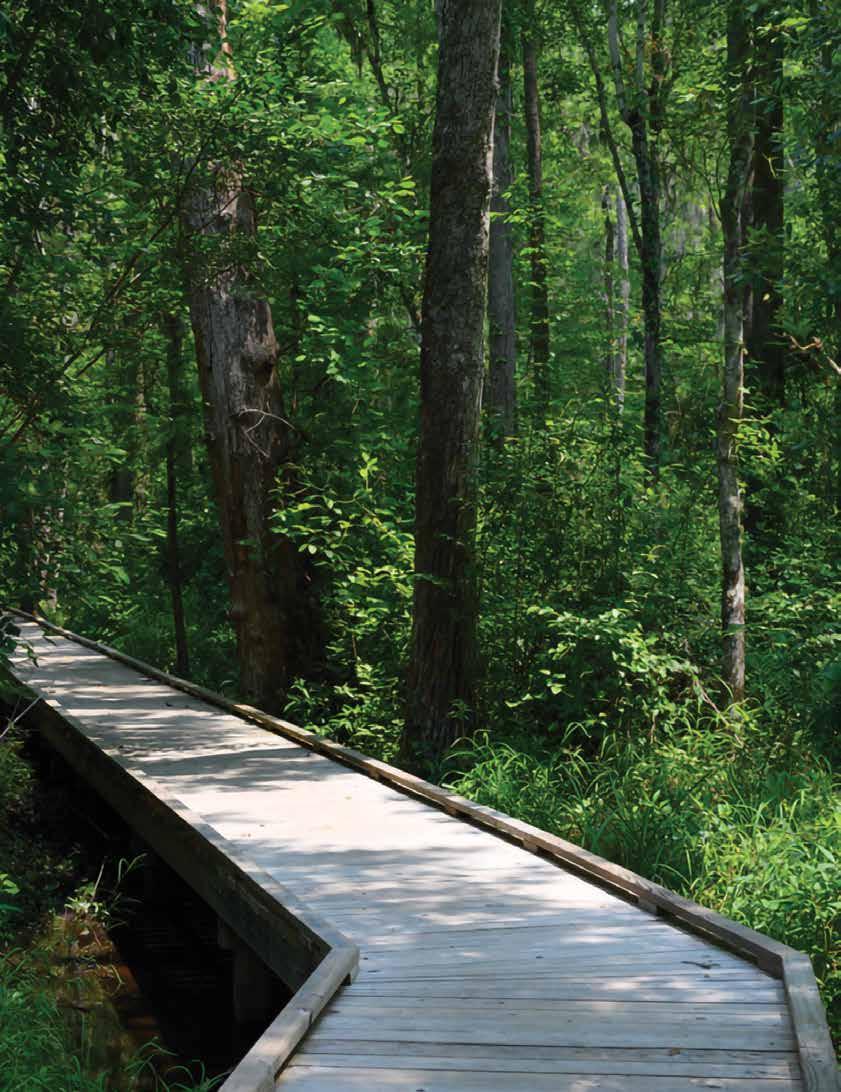


If individuals want a taste of the mountains without leaving the region, Poinsett State Park in the Wedgefield community of southwestern Sumter County is a nice alternative for area residents and tourists.
The 1,000-acre park surrounded by Manchester State Forest offers hiking, running and mountain biking trails, a lake for fishing, canoeing, kayaking and swimming, full-scale campgrounds, cabins and more, according to Poinsett State Park Manager Mark Owens, who recently took Lakeside on a tour of the park.
Originally constructed by the Civilian Conservation Corps as part of President Franklin D. Roosevelt’s New Deal program in the 1930s, Poinsett has earned the name “Mountains of the Midlands” for its trails and elevation peaks.
The park is rich in cultural history because it was originally home to the Singleton Plantation. The Singleton family was a prosperous farming family that helped settle present-day Sumter County in the mid-1700s, according to accounts. A Revolutionary War skirmish was avoided at the site because of a case of smallpox at the family’s plantation, Owens said.
The trails include the popular 1.4-mile Coquina Trail, which showcases Poinsett’s ecological diversity, takes hikers and bikers up some of the elevation and includes a mountain flower named mountain laurel.
The flower grows in the Upstate and at Poinsett can be seen covered by Spanish moss, which is only found in the Lowcountry, making it a natural phenomenon at the park, he added. Mountain laurel is in season in early spring.
A variety of animals can be found in the state park, including a large assortment of birds – woodpeckers and owls included – otters, beavers, snakes, deer, turkeys, frogs and an occasional alligator, Owens said.
The trails feature geocaching, which is an outdoor recreational activity like a scavenger hunt using GPS software, according to Park Ranger Jacob Turner.
A 10-acre lake sits in the middle of the park for fishing and includes a designated swimming area open from Memorial Day through Labor Day. Guests can rent kayaks, canoes, jon boats or stand-up paddle boards (called SUPS), Owens said. Bass, brim and catfish are popular catches.
A two-tiered spillway, or waterfall, built by the Civilian Conservation Corps is also a must-see, he added.
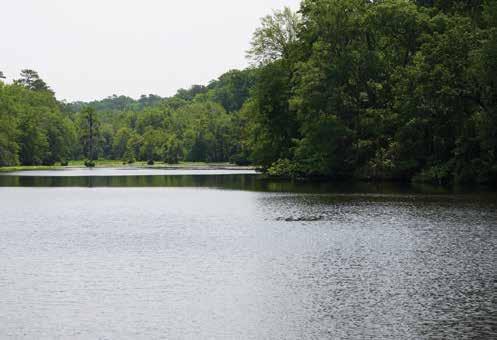



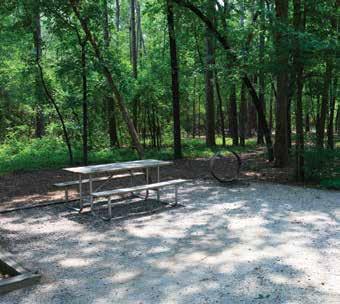
Poinsett’s proximity to well-known Congaree National Park in Richland County is only a 45-minute drive and helps to draw visitors, Owens said. Interstate 95 also runs through Sumter County and increases the number of out-of-state tourists.
An estimated 80,000 visitors from across the U.S. and other countries frequent Poinsett each year with the spring and fall months the busiest, given the milder temperatures during those times, he added.
A shaded campground area is popular also in the spring and fall, and all campsites include a picnic table, fire ring and water access.
Five cabins that range in size are also available for rent with weekday and weekend rates and provide a rustic style.
Owens and Turner said Poinsett is an ideal place for people and families to unplug, unwind, get back to nature and spend time together.
Staff participate in Read with a Ranger programs at area libraries, and the park is also available for school field trips, Owens said.
There is a small admission fee into the park, but children 5 and under enter for free. For those who cannot afford admission, families can partner through the South Carolina county library system for free admission if they have a library card, he added.
Poinsett is open 365 days a year, from 9 a.m. to dark daily.
ADDRESS: 6660 Poinsett Park Road, Wedgefield, SC 29168
PHONE: (803) 494-8177
HOURS: 9 a.m. to dark, year round
ADMISSION FEE: Adults (16-64) $3; S.C.
seniors (65 and older) $1.50; children (6 to 15)
$1; kids 5 and under free.
WEB: southcarolinaparks.com/poinsett


For all your commercial real estate needs in Clarendon and Sumter County.

































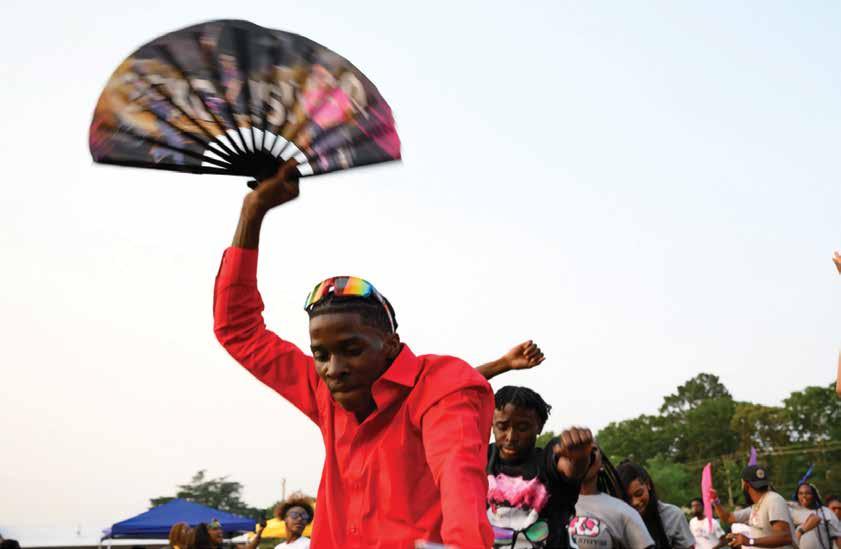
By Alaysha Maple
roads
viral feeds, field parties rooted in Black cowboy history are making room for joy, style and belonging
Before social media caught wind of the rhythm and swag that echoed through Southern back roads, there were Black cowboys.
Smithsonian Magazine estimates that by the late 1800s, one in four cowboys in the American West were Black, many formerly enslaved and trained in the art of cattle tending and saddle work. Their legacy spanned Texas prairies, Louisiana bayous and the red dirt roads of the Carolinas, where their history is passed down on front porch steps and through photo albums. And somewhere in those oral storytelling sessions, a new ritual began.
No one can say exactly when the first trail ride happened, but its origins can be traced to African
American migration from rural to urban areas in the South between 1900 and 1941. Andrew Sluyter, author of “Black Ranching Frontiers: African Cattle Herders of the Atlantic World, 1500-1900,” said free Black equestrians immigrated to Louisiana after the Haitian revolution in 1804, and after emancipation and long into the 20th century, Black people were excluded from white-only rodeos, forming their own corral of cowboy culture.
From Louisiana to the Lowcountry, this once-quiet tradition has evolved to include horses and hot plates, fringe denim and four-wheelers, and line dancing and legacy building. It’s part rodeo, part fashion show, part family reunion.

"The thing that I love about it is there's no discrimination [of] race, sex, gender; whatever it is, everybody is welcome."
-Donna Dawson

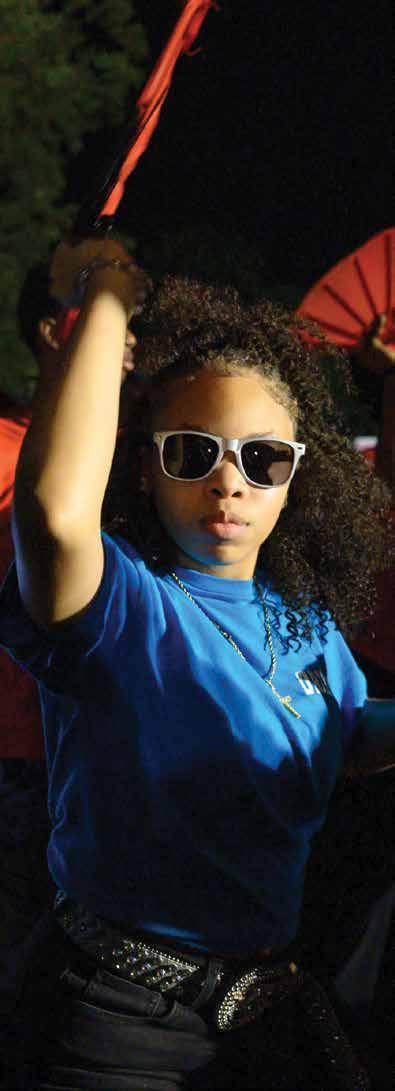

And that couldn’t be more alive than in places like Sumter, South Carolina.
“The thing that I love about it is there's no discrimination [of] race, sex, gender; whatever it is, everybody is welcome,” expressed Donna Dawson, founder of TruKuntry Steppas in Sumter.
Though a country girl from Wedgefield, Dawson didn’t grow up going to trail rides. In fact, she didn’t even know what one was until a few years ago after watching videos online of people riding trails and dancing in dirt fields, their joy contagious.
Her first in-person experience at a trail ride was four years ago in Shelby, North Carolina. No less than 100,000 people had their boots on
the ground — way before it was the popular tagline of a hit song — and their horses clacking their hooves. Trailers, RVs and campers were scattered across the land, housing folks who had camped out since Wednesday. Folks spend their Thursday and Friday enjoying the great outdoors and connecting with riders from near and far. On Saturday, the two- to three-hour trek on the marked trail allows riders of all ages to experience nature and connect with horses on a deeper level.
A separate component, which has taken the world by storm, is field parties. These social events prioritize entertainment and celebration through line dancing, music, food, drinks and other forms of entertainment. Some trail rides will include field parties, though it’s not a requirement.
In witnessing the true essence of a trail ride in real time, what
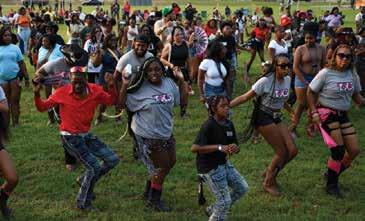
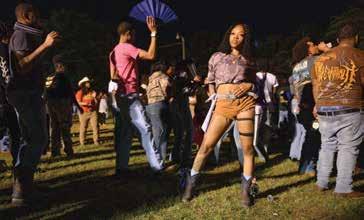
Dawson found was not just an event, but a movement — and she wanted to get a move on including Sumter.
Around the end of 2022, she started pulling people together — from riders to dancers to dirt slingers, who ride ATVs. The group would travel to trail rides and field parties both big and small, watching how the culture moved — not just in its synchronized steps but in how crowds grew bigger each go ‘round. Before long, she gave her crew a name — TruKuntry Steppas, signifying that no matter where they may go, they remain true to their roots.
In the beginning, she started with only 10 members. Now, her family has grown to more than 60. And she puts great emphasis on the word family — because for her, “Mama D” as she is lovingly called, that’s what it’s all about.
“Their stories bring me to tears. I have two members, right before they joined, tried to commit suicide, so this is their family. I have a few that don’t have family here, so this is their family. I got some who were just in their little shell, wouldn't dance. Once they got in the group, it's like they blossomed,” she explained. “It’s so crazy to see where they came from and where they are now. It's like we are a family, and that's what I call us — family.”
Tunes and threads are some of the driving force behind the virality of field parties. Whether R&B, country or a mix of both with a hip-hop twist, when the rhythm in the feet meets the flick of the fan — an accessory
and Rosetta stone that can be customized with sayings and shades to fit the occasion — it produces a language that pleases the ear and touches the soul. Some people add their own flair on the fashion, mixing fringe with cow hide or denim on denim and rhinestones. Others, like TruKuntry, keep it simple with a laid-back T-shirt and camouflage pants. Either way, it’s all in how you express yourself with movement and fabric. But recently, it can also disguise the essence of the event.
Social media has amplified the culture in a way traditional means of media consumption never could. On Instagram, Facebook and especially TikTok, viral dance clips have catapulted small-town dancers to national recognition.
The widespread consumption of trail rides and field parties has made those once teased for being “too country,” as Tina Williams of Metro’s Phinest Steppas in Columbia described, feel validated. Williams said trail rides and field parties are few in South Carolina’s capital city, meaning they make the worthy drive to neighboring counties, like Sumter, to “socialize and feel connected” to their roots and each other.
And Dawson is pleased by its growth. She’s pleased to see young people gather and express themselves through dance and their different threads, all in the name of good fun. But such growth also comes with growing pains.
“You see a lot of stuff on social media about people dancing this way or that, and then it's almost like you're bullying them. We're not going to tolerate that because that's not how it started. [Field parties]
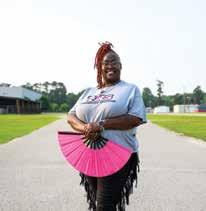
Donna Dawson, lovingly called "Mama D," was first introduced to trail ride culture in Shelby, North Carolina, on a trip with a few friends. After being among the fun and fellowship of folks across the South and beyond, she decided to bring it back to Sumter, creating TruKuntry Steppas in 2022. This group, growing from 10 to over 60, is her family, one complete with people of different backgrounds, stories and struggles who all embrace the culture of trail rides and want to share that wherever their boots take them.

started as line dancing, fun and fellowship. Somewhere along the way, in the last six to seven months, it's almost like a competition,” Dawson explained. “It's taken away from what was started, and that's what we're trying to get back to.”
Dawson has members who are as young as middle-school age and others who have full-fledged careers. Yet, regardless of where they are in life, she reminds them that being part of this team, this movement, means being part of something bigger than yourself. If they’re asked to perform at an event — take their appearance at the 2025 UniverSoul Circus, for example — they don’t charge; donations are appreciated but never expected. If they’re the entertainment for a hometown party, they’re only looking to have a good time. The lights, camera and views are fine, but the enjoyment of the culture and all it has to offer, on the trail, in the field and everywhere in between, is what they’re after.
As the trail ride culture gains more traction online, some of the intimacy will fade — it’s inevitable. There’s a distinctive difference between being recorded and being witnessed. That’s why even as Dawson and TKS embrace the attention, they stay intentional.
This life started on horseback. Black cowboys claiming space where they weren’t always welcomed, building a culture of pride and perseverance. And while trail rides still, and will always, remain stitched to the land, field parties have caught the world’s attention with their color, choreography and the way you feel loved even if you show up alone.
Rather than a distraction from the roots, it serves as a gateway. It’s how the younger generation finds its way back to something they didn’t know they needed. It’s how the elders get to see the legacy continue, one welldressed cowboy or cowgirl at a time. So, the world can scroll, share and repost. Because what lies among the sprawling Southern fields can’t be captured in a 30-second clip.





• Tree Removal or Trimming
• Stump Grinding
•Underbrush Mulching
• Lot Clearing
•Land Management
LANDSCAPING
• Total Landscape Service
• Sod Installation
• Irrigation Installed or Repaired
• Erosion Control
• French Drains Installed
• Any Size Clean-Up Job
• We Sell & Install PineStraw, Mulch, Rock, Fabric, Metal or Rock Edging, Plants, Trees and Flowers for Your Beds


























































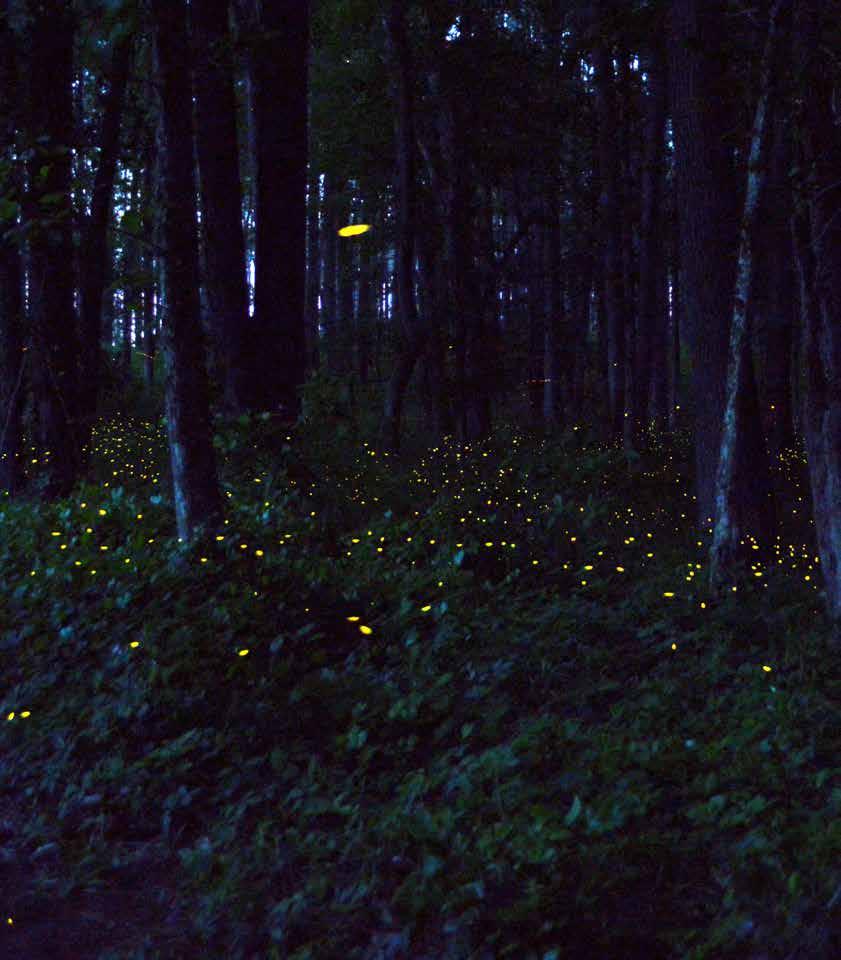
There comes a couple of weeks within the deep old-growth forests of Congaree National Park, in the pitch-black night, when you will experience something unlike anything else. All around you, if you are lucky enough to be in attendance, there will be people but no sound other than the shuffling of feet on a boarded trail and a soft “excuse me” here and there.
It starts slowly, with one or two tiny pricks of light, but it soon expands into one after another after another until the forest has little lights all over the place.
It’s a one-of-a-kind experience; it’s the magical synchronous fireflies of Congaree.
For exactly two weeks in May every year, Congaree opens its gates to a lucky crowd. For those two weeks, about 400 people are chosen a night from a lottery to see the synchronous fireflies up close.
The synchronization is a mating ritual for the fireflies, which are known as Photuris frontalis, and if you’re a fan of nature, it is truly fascinating.
The viewing used to be open to the public, but after the COVID-19 pandemic began in 2020, the park changed how it was doing things. The synchronization phenomenon also takes place at the Great Smokies in North Carolina, and that park began using a lottery system in 2016. So, people began to be directed away from the Great Smokies to Congaree for its open firefly viewing.
As more people flocked to Congaree, the more the firefly viewing became less and less magical. The influx of people drove fireflies away, and the large attendance, totaling almost as many in one night as there are during the whole event now, made it unpleasant for everyone.
Though it is harder to view the synchronous fireflies now, the decision ultimately makes the experience better for both attendees and fireflies.
This season’s firefly viewings have ended, but here’s what to know for next year. There are 145 passes given out per night, and the pass holder must be present in order for it to be useable. Up to eight people can attend with one pass, but the pass is only for one car, so you can’t split up vehicles. There is a $1 non-refundable fee to put your name in the lottery, and if you are selected you must pay the remaining $19 for your pass.
With more than 24,000 people entering the lottery this year and only 1,160 passes being given out, the odds are not in your favor to get a pass to the park during the synchronous fireflies event. But, according to Chief of Visitor Services at Congaree Jon Manchester, there are still ways to see fireflies in your community, even if it won’t

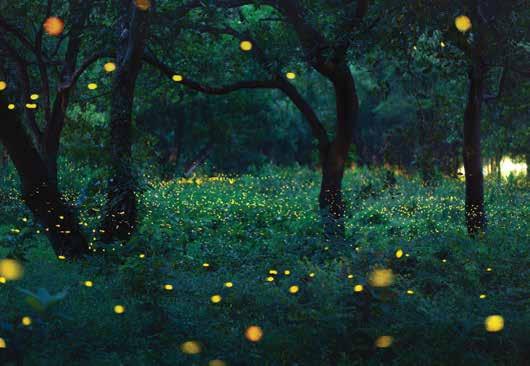

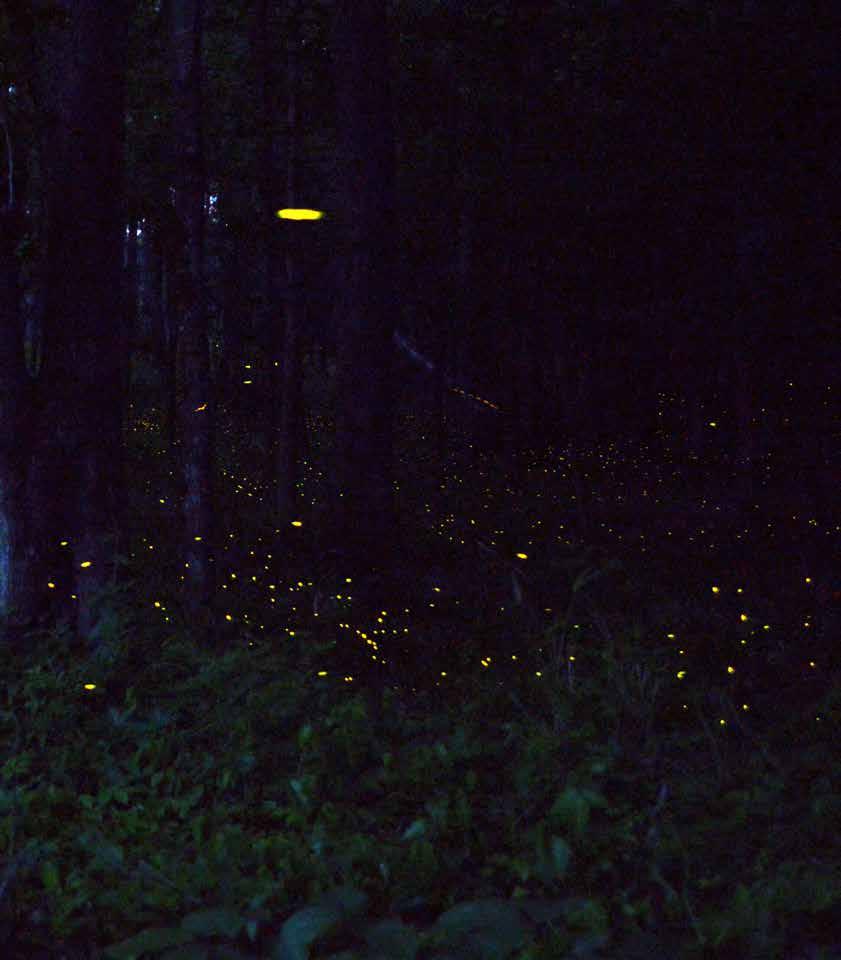
be in the same quantity.
Firefly populations have declined over the years, with one reason being the prevalence of pesticides. You don’t necessarily need to have a yard overflowing with mosquitoes to see fireflies again, though.
Plants such as American beautyberry and Citronella naturally repel mosquitoes while not bothering fireflies. It’s also a good idea to be wary of still water in your yard, which will draw mosquitoes in.
In general, planting native plants is helpful to all sorts of wildlife, including fireflies and birds. Fireflies typically like brush and understory, so Manchester recommends not immediately leaf blowing or raking up grass clippings. Planting shrubs is another way to increase firefly populations, and even keeping your grass slightly longer than usual could expand the number of the glowing insects in your yard.
And a tip that is good for the fireflies and for your electricity bill is to keep unused lights off in your house. It’s a tiny thing you can do to make fireflies more comfortable.
Keep your eye on Congaree’s firefly page to see when the lottery will open back up in spring 2026 at https://www.nps.gov/cong/fireflies. htm.
In the meantime, the park has camping, canoeing, fishing and trails galore!
Congaree National Park is at 100 National Park Road in Hopkins, S.C., and does not charge a fee for entrance.
Fireflies use their light, known as bioluminescence, mainly to communicate and find mates. They produce this light by combining oxygen with a substance called luciferin in special cells under their abdomens, creating light with very little heat. Each species has a unique flashing pattern. Male fireflies flash while flying low to the ground, and if a nearby female of the same species sees the pattern, she responds with her own light to help him find her.
In addition to attracting mates, the light also warns predators. Even though fireflies are easy to spot, animals like birds and toads avoid eating them because they release toxic, bad-tasting blood. Their flashing acts as a warning signal to stay away.
• Large groups of fireflies sometimes blink in unison, or at the same time.
• Even firefly eggs glow.
• Firefly light can be yellow, green or orange.


S a r d i n i a S a r d i n i a
G a b l e G a b l e
H a r v i n H a r v i n
S i l v e r S i l v e r
W i l s o n W i l s o n ee
t P a u l
J o r d a n J o r d a n
F o r e s t o n F o r e s t o n
W o r k m a n W o r k m a n
W e l l s W e l l s
E u t a w v i l l e E u t a w v i l l e
F o u r F o u r H o l e s H o l e s
S a n d r i d g e S a n d r i d g e
W h i t e s v i l l e W h i t e s v i l l e
G r e e l e y v i l l e G r e e l e y
H e i n e m a n H e i n e m a n
B o n n e a u B o n n e a u










803-854-3000 or 1-800-476-0059
Buck Travis (Owner), Scott Clark (B.I.C.) Eletha Travis (Office Coordinator)


























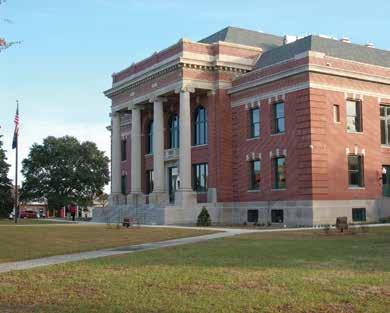




































By Alaysha Maple
the pitter-patter of hooves on packed Carolina dirt. The wind-cutting whoosh of jockeys thundering past excited onlookers. And somewhere across the way, the squealing laughter of children slipping through fields and chasing down memories.
It’s The Elloree Trials — a thoroughbred and quarter horse racing event that dates to the 1960s and spans generations of horsemen, Greg Smith being one of them.
For Smith, a fourth-generation horseman and director of the Elloree Training Center nestled in the cut of 170 Wishbone Circle in Elloree, the trials are not just a tradition but a testimony to the culture this community has cultivated.
“It's kind of a rite of passage for a lot of the folks in this neck of the woods. Everybody uses it for a family reunion, so many of the young kids are graduating and going out into the world [so] it's a last hurrah, if you will.”
The Elloree Trials began in March 1963 as a local answer to an ageold question: How do we prepare young horses for the real world of racing? What started as mock races — created by former track owners George and Phil Utman in partnership with the local Chapter of Jaycees — has grown into a full-blown celebration that attracts thousands.
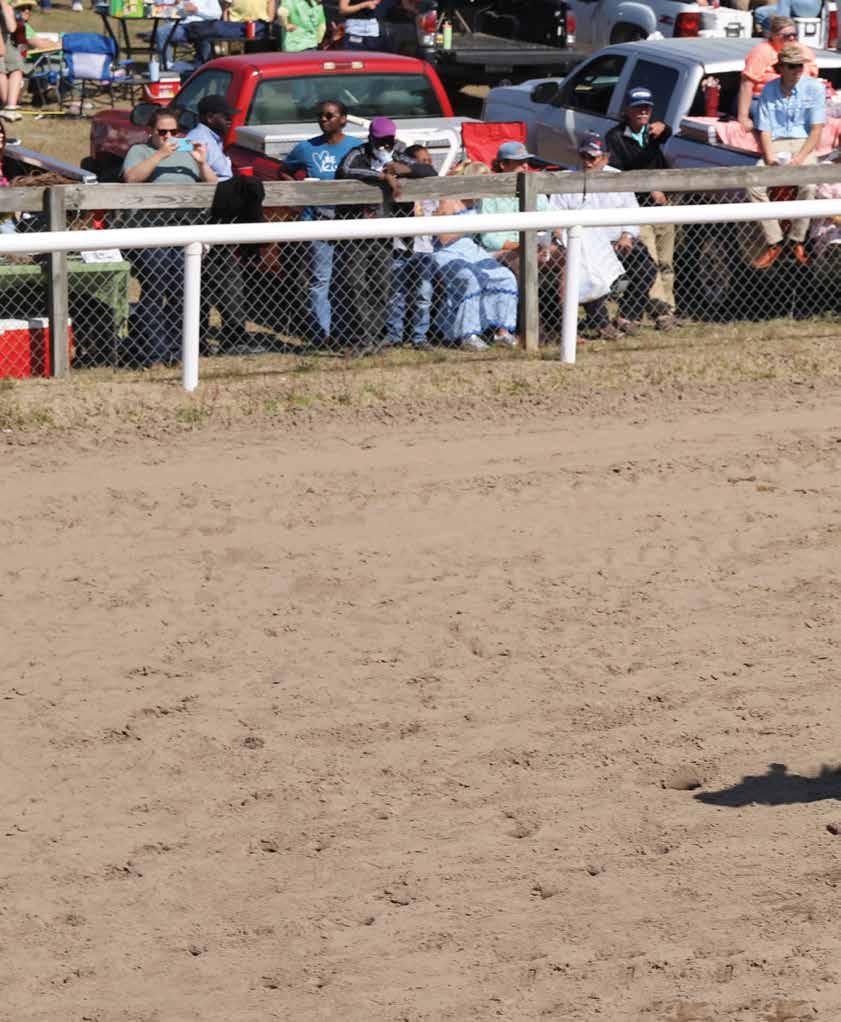
Some years, as many as 5,000 people have swarmed Elloree Training Center’s sprawling acres, bringing with them the flavors of homemade barbecue, expressive handmade hats and garments and the kind of Southern joy
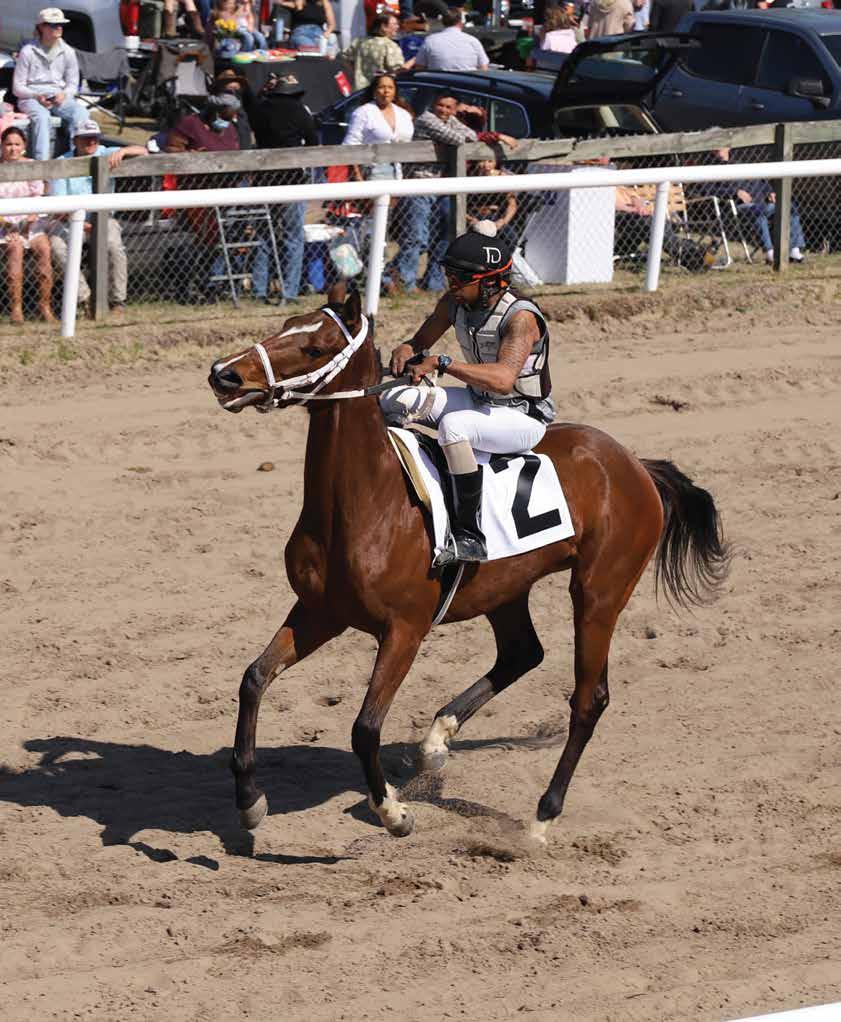
you can’t buy or stage.
But like all things that endure, the trials weathered their fair share of storms. The COVID-19 pandemic in 2020 silenced the races for two years. The event would make a comeback in
March 2022, thanks to the hard work of administrators Margaret “Miss Anne” Baker Garrett and Debbie Jobe, who, alongside the Smith
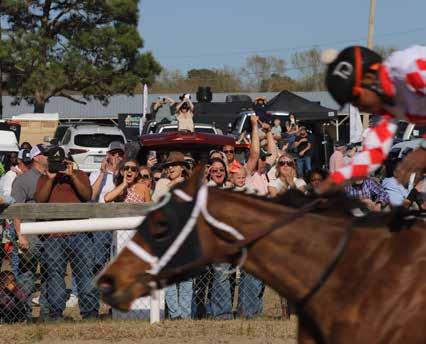


The Elloree Trials is a revived South Carolina horse racing tradition,rooted in community and care.Led by Greg Smith,it honors horses as valued partners.
family, worked tirelessly to produce the trials. Shortly after Jobe retired in late 2022, “Miss Anne” passed away.
In fall 2022, as the year was coming to an end and many in Elloree and surrounding communities were looking forward to its return in March 2023, the Elloree Trials Committee and Palmetto Jockey Club made the announcement that because of “unforeseen circumstances,” the trials would no longer be held. The absence of Jobe and Garrett was felt deeply, and the looming fate of the trials raised concerns about what would become of the beloved spring affair.
Fast forward to Thursday, Feb. 23, 2023, when a large group of Elloree locals and longtime trial attendees came together with the
goal of preserving the annual tradition. Since its first meeting, the Elloree Palmetto Jockey Club was established. Its board members, subcommittees and volunteers were able to get the trials back on track in March 2024, and they have been going strong since.
But while the event brings annual entertainment to the surrounding community, it serves as an inheritance to Smith.
Smith has spent a lifetime in the saddle and at the barn. His grandfather entered the thoroughbred industry in the 1930s, and Smith was 13 years old when he started galloping horses for his father. His hands, now calloused and experienced, have held generations of equine athletes, from nervous yearlings to million-dollar champions, all across the country.

When he wasn’t training them, he experienced horsepower “in its purest form” as he raced horses for decades, feeling the switch from 0 to 40 mph in seconds on the back of the thoroughbred. He would break his back three times by the age of 40 before retiring. To this day, he’d give anything to do it all over again.
“It's the best drug I've ever had in my life, and I don't do drugs,” he said through laughter. “The adrenaline, the endorphins — it's hard to explain to folks the rush that comes along with that.”
Once his father purchased the Elloree Training Center in 1976, they weren’t only concerned with preserving the land and its legacy, but also building on it for the sake of the sport and its future athletes. Under their stewardship, the property transformed into the largest privately owned public training center in the southern United States, spanning more than 1,800 acres at its peak, according to Smith. From two barns to eight, from a few stalls to about 250, from a few attractions at the trials to the British Car Club from Charleston and iconic Budweiser Clydesdale horses, the Smith family poured their hearts and livelihoods into making Elloree a sanctuary for horses and the people who love them.

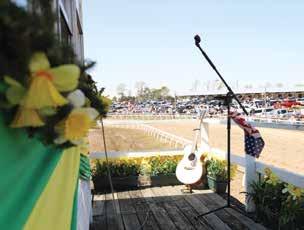
“I want folks to understand the beauty of these animals, and when you talk about maintaining and keeping thoroughbreds going in this country and racing going in this country, you have to realize what coincides and goes hand in hand with them,” he explained. “The pasture land, the farmland, the beautiful farms. There's not solar farms, there's not high rises, there's no asphalt; this is agricultural. They are all about agriculture. It takes the hay, it takes the grains, it takes everything that Mother Nature has underfoot to sustain them.”
But for all those trophies and ribbons, Smith’s greatest lessons about this industry didn’t come from the winner’s circle. They came from the animals themselves.
He’ll tell you, a thoroughbred has the emotional and intellectual capacity of a 4-year-old child. They remember kindness. They recognize faces. They feel joy, fear, pride and sorrow. They come to him, in a humansense, as kindergarten students — wide-eyed, cautious, yet curious and wobbly on their feet. By the time they’re ready for the big leagues, they’ve graduated to college students, equipped with the stamina and skills to keep pace with the fast-changing industry. But at times, those lessons are not easy to listen to or
learn. He’s seen firsthand well-trained horses become startled during a race and run off the tracks. He’s seen riders thrown off their backs and facing terrifying landings. He’s seen horses experience horrific injuries and even worse ends. He’s learned that what makes a great trainer is not brute strength or bravado but the ability to have empathy, patience and trust.
And it’s that philosophy — the understanding that horses are not just tools, but teammates — that defines the way Smith and his staff lead the trials.
“Come up around the barn, see what we do, see how we do with the horses and all the things that we do,” Smith recalled his encouraging words to skeptics. “So many people have kind of a [skepticism] about horse racing, saying we do this to them and we pump them up on this and we give them all of this. Some folks do those kind of things, but the majority of folks love and care for their horses as if they were family members. Quite frankly, the people that bring their horses here, those horses are family members.”
His voice goes soft as he talks about the future, not just of the trials but the horseracing industry as a whole. Though the number of thoroughbreds may dwindle, the next
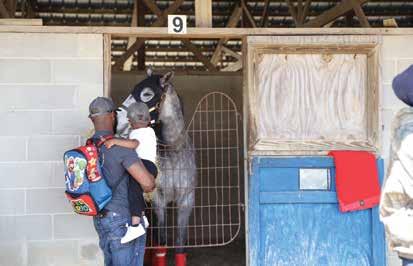
generation of equine enthusiasts is as strong as ever — and the trials and training center plan to play a part in their longevity.
His children, who will hopefully be fifth generation, are growing up immersed in the world. Every year, during the trials, the horses are left in the barn specifically for the kids to visit. When he hears the hoots and hollers of generational trial attendees and horsemen standing at the track rail eager to feel the thunder in their chest as the horses fly by, watches as youngsters lock eyes with a curious foal and mares in the stable, smells the dust settle after the beautiful rush of hooves on the bronze-colored sands, feels the warmth of long-awaited hugs and the taste of homemade dishes, it’s all worth it. And he wants others to experience its magic.
“We want you to come out and just enjoy a day on the farm with some good old-fashioned horse racing, some good food, some good friends and enjoy yourself,” he said, his voice going soft at the end. “That is the simplest way that you can put it.”
-170 Wishbone Circle in Elloree, S.C.
-Open 8 a.m. to 5 p.m. Monday-Sunday
-Phone: (803) 897-2616
-Website: www.elloreetrials.com
-Elloree Trials takes place annually on the third Saturday of March. The next is scheduled for March 21, 2026.









































































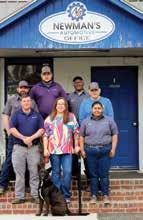














Relinoca Farms, a family run backyard nursery, received a $25,000 grant to open a storefront and education center. After overcoming setbacks, they now focus on growing native plants and teaching others. The farm is a true family effort, with all four children involved.
By Deirdre Currin



usually funded, Charlotte and Kenzie decided to give it another go. After waking up at 5 a.m. for more than a month to work on the farm’s 47-page application, presenting a video to a panel of judges, showing various records and presenting their business plan, Relinoca Farms was awarded the largest amount in ACRE grant money possible: $25,000.
“I feel so accomplished and like I’ve contributed to [the business] because he’s the grower,” Charlotte said, gesturing to Kenzie. “I’m not gonna lie, he is the main grower – I do the books and the business and the watering, but I feel so accomplished to have directly contributed to our business.”
To put into perspective how big of a deal the grant was, Charlotte said she felt more over the moon about the grant than when she received her PhD in educational psychology.
And the family’s plans for the future are major. With the $25,000 in grant money, they will be setting up their own retail shop and educational center.
Currently, the Jameses have everything set up at their home, including the greenhouses in the backyard and the seeds germinating in their garage. It isn’t an official retail space, and the family doesn’t necessarily open up their backyard nursery to anyone and everyone.
Instead, they utilize Facebook, where they go by Relinoca Farms LLC. They also sell at farmers markets, namely at Kershaw County Farmers Market in Camden every Saturday morning from 9 a.m. until noon.
With the grant, the way the farm sells its native plants will completely change because they will have a traditional storefront, and it will be exceptionally close to their home. In fact, it may as well be in the backyard of their backyard.
Back in 2020, the military had the Jameses move to the UK, so the family packed up and left with the expectation of remaining there for about four years. Their plan was to begin farming on an 11-acre plot of land they owned when they returned; however, their plans changed in more than one way.
The James family ended up returning home after 14 months, giving them considerably less time than they anticipated to start their business. The family purchased a home in Sumter to stay in until they could build on the land they had in Camden that they planned on using for their growing endeavors.


However, they soon learned that their HOA in Camden forbade greenhouses, meaning they would be unable to even begin planting in the area. This was a big wrench in their plans, but that didn’t stop them. They sold the 11 acres of land and began growing in their backyard, but they knew they would never be able to have a retail space there.
With some help from their Realtor, Charlotte and Kenzie were able to cut a deal with the owner of their subdivision, purchasing the 10 acres behind their lot’s boundaries, and that is where Relinoca Farms’ retail space and
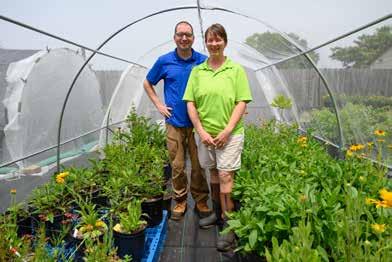

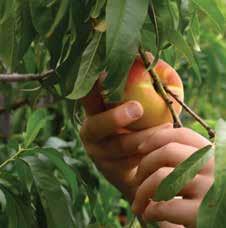
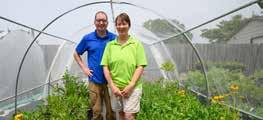

education center will be.

The land is heavily wooded and must be cleared, but the Jameses have big plans, and you can be on the lookout for Relinoca Farms’ storefront opening this fall.
“It has been like one battle after another, but everything has been overcome, and that’s that feeling of validation that once this fire’s put out and this fire’s put out and for the foreseeable future we don’t see any more fires yet, this is how I know that God’s telling us that we’re moving in the right direction,” Charlotte said.
For three years, Kenzie and Charlotte have been working and learning more and more about plants. What got them into gardening was native plants and how they can help the environment.
Kenzie explained that many first-year gardeners can get frustrated after unsuccessfully tending their gardens because larger plant retailers tend to sell a variety of plants, which might sound alluring but doesn’t mean those plants will thrive in South Carolina’s environment. The plants Relinoca Farms offers are all native and acclimated to our environment and include native landscaping plants as well as vegetables and herbs.
“For our native business, everything has a purpose here, and we want things to grow well, we want things to grow low maintenance for customers,” Kenzie said. “Not things that just look really good but things that are functional as well, whether that’s edible, edible for wildlife, habitats as well.”
One thing that makes Relinoca Farms unique is how they raise their plants from seeds, which is not necessarily a common practice. It all goes back to how well a plant will thrive in its environment, and when it goes to seed where it will be planted, the growth is more likely to thrive.
“We have [plants] for shade, we have some for sun, we have some for dry

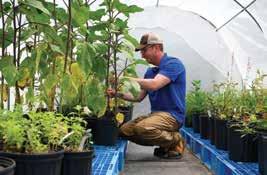


soil, we have some for wet soil; we try to do a little bit of everything to match everyone’s needs,” Charlotte said.
But, even with native plants raised in native soil, gardening can be tough. That’s where the education center comes in.
Charlotte and Kenzie want the area to be able to accommodate groups of aspiring gardeners, seniors and more to learn more about how to raise their plants. Charlotte homeschools their children, so one of the uses she had in mind was hosting homeschool groups to learn more about horticulture and the environment.
Of course, even without an education center, they are more than happy to answer questions about plants, and one of their four helpers is sure to improve the mood of anyone struggling with upkeeping the garden.
Reid, Liam, Noah and Catherine literally make up Relinoca Farms, with the first two letters of each child’s name being the backstory behind the farm’s name: Re-Li-No-Ca.
“I think they understand their value and their worth, that this is definitely a family operation and we couldn’t do it without their help, too,” Charlotte expressed.
And it’s true the children are an important part of the farm, and each has an important role to play.
“It’s fun, and it feels weird at the same time,” Catherine said about living around so many plants. “I know many other kids who are like, ‘Oh, you work in a farm? That’s fun.’ And sometimes it’s fun, sometimes it’s not. Washing pots isn’t fun, but watching the plants grow is, so it’s a half-and-half experience, but most of the time it’s fun.”















































































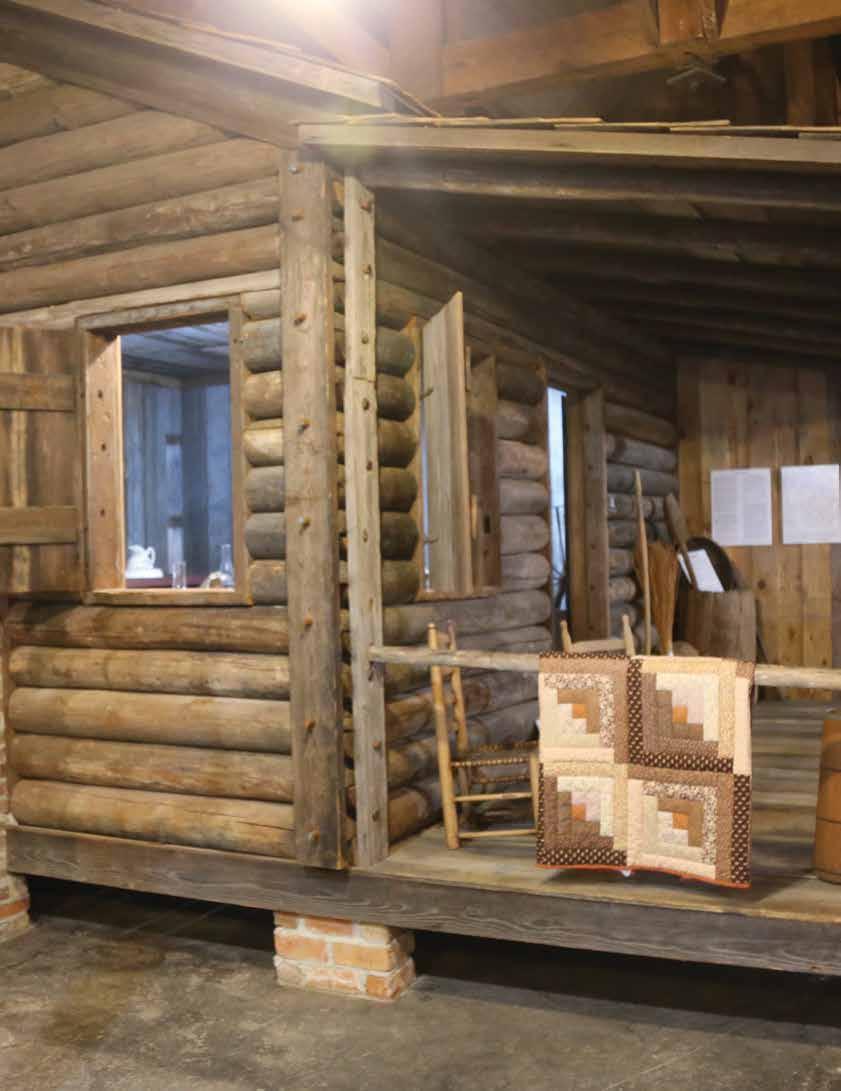
ELLOREE HERITAGE MUSEUM AND CULTURAL CENTER
ADDRESS: 2714 Cleveland St., Elloree, SC 29047
PHONE: (803) 897-2225
HOURS: Wednesday – Saturday: 10 a.m. to 5 p.m.
ADMISSION: Adults $6; seniors (60 or older) $5; students $3; children (5 and under) free

Elloree Heritage Museum and Cultural Center, filled with stories, captures small
By Bruce Mills
The eastern portions of Orangeburg County near Lake Marion are mostly known for fishing and shopping, but tucked in the small town of Elloree is a museum that offers a rich cultural experience. Built essentially by passionate volunteers, Elloree Heritage Museum and Cultural Center showcases what life was like in the town in the 1890s and early 1900s through exhibits and activities and promotes art and culture for the greater community, according to Elloree resident and museum contributor Pat McLaurin.
Like communities throughout the Wateree to Santee region and South Carolina as a whole, Elloree has a rich history and became a thriving town after humble beginnings as a little crossroads with a few dusty wagon roads that led to Orangeburg, Columbia, Charleston and over to the Santee River.
During a town revitalization period in the 1990s, the town came up with the idea to develop a heritage museum to preserve and document the area’s past and presented the concept to a small group of people, McLaurin said. A building was given to a committee of three residents, and soon thereafter the idea became a reality.
The town was formed after the Civil War and established in 1886 largely because of the efforts of local businessman, farmer and minister William Snider, McLaurin said.
According to historical accounts, Snider acquired 2,660 acres in the 1860s in the vicinity of the future town and developed the community by giving land for schools and churches to African Americans and whites.
Snider’s wife, “Miss Lizzie,” was responsible for giving the community the name Elloree, which is a Native American term meaning “The Home I Love.”
In another inducement to attract residents and businesses, Snider brought the railroad into Elloree that helped put the town on the map, she said. According to accounts, he persuaded officials from the privately owned Eutawville Railroad Co. to extend their tracks 20 miles from Eutawville to Elloree. The first train arrived in 1886.
Originally a farming community, Elloree became a thriving town by the late 1800s and early 1900s, McLaurin said.
Through the decades, the town continued to thrive as an agricultural community.
“Downtown was king, and everybody came to town on Saturday,” she added.
The heritage museum and cultural center captures the town’s history and charm and was completed in multiple phases, according to McLaurin, who is also a former museum board member.
A small farm wing in the back of the museum initially opened in October 2002.
Today that wing showcases the town’s railroad that transformed the town.
Another main exhibit is Snider’s Cabin, where William Snider was born. The structure was moved from outside of town into the museum and includes the original wood, McLaurin said. The family room is on display as the home appeared in 1868.
The “streetscape” wing came next and showcases downtown Elloree in the early 1900s. Exhibits include the town’s barbershop, original bank, hardware store, Dantzler’s Drug Store, a general store and Bardin’s Hotel, where traveling salesmen would stay.
The museum also includes a gift shop, which helps support the museum, and an upstairs gallery that includes permanent and semi-permanent displays, she added.
The gallery includes the Elloree Trials, a popular horse-racing event, and racetrack memorabilia. A room also features Chris Antley, an Elloree native, who won the Kentucky Derby twice (in 1991 and 1999) and the Preakness Stakes (1999).
An art room is also upstairs and hosts summer art camps, McLaurin said. She added the museum was completed “piece by piece” as funding was obtained through grants, fundraising, money from Orangeburg County, admissions, donations and more.
The building was designed by local architects and built by town volunteers, and McLaurin added, “It’s been a labor of love for our community.”
“The museum was an effort of the whole town, and it just tells the story of us,” she said. “People poured their hearts and stories into it.”
Programs offered today include art camps, children’s programs, school tours, farm programs and more and provide the only cultural experience in the area, McLaurin said.
Docents dressed in period clothes originally explained the exhibits and still do so today for school groups or large visiting groups. Now, audio wands with recordings from professional speakers guide many people through the museum.
In downtown Elloree, the museum is seven miles off Interstate 95 and about 12 miles from I-26. In an ideal spot, visitors come from everywhere to includes states across the U.S. and numerous countries. International visitors in recent years have come from India, England, Ireland, Canada, Norway, Italy, Germany, Istanbul, Turkey, Australia, France and Africa.
McLaurin calls the museum “a hidden gem.”
“For everybody who comes in here, the museum takes you out of the busyness of today back to the roots of what life was like back then and how people cared for each other as a community,” she said.
Through the years, a few celebrities and other famous people have visited the museum, but McLaurin said “the really famous people are the volunteers who donated their time, ideas, money, items and much more to create this special place.”
The original Elloree bank eventually became what is known today as SouthState Bank, which is headquartered in Winter Haven, Florida, and has branches in multiple states.
Source: Elloree Heritage Museum and Cultural Center
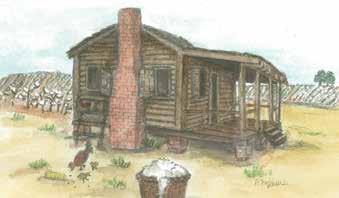


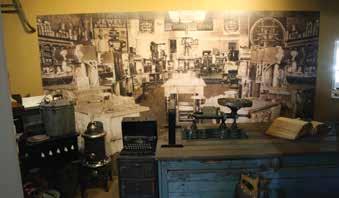







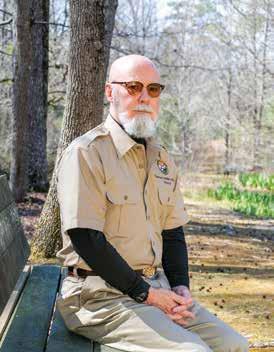


















McLeod Regional Medical Center
McLeod Health
Cheraw
McLeod Health
Clarendon
McLeod Health
Dillon
McLeod Health
Seacoast
McLeod Health
Loris
